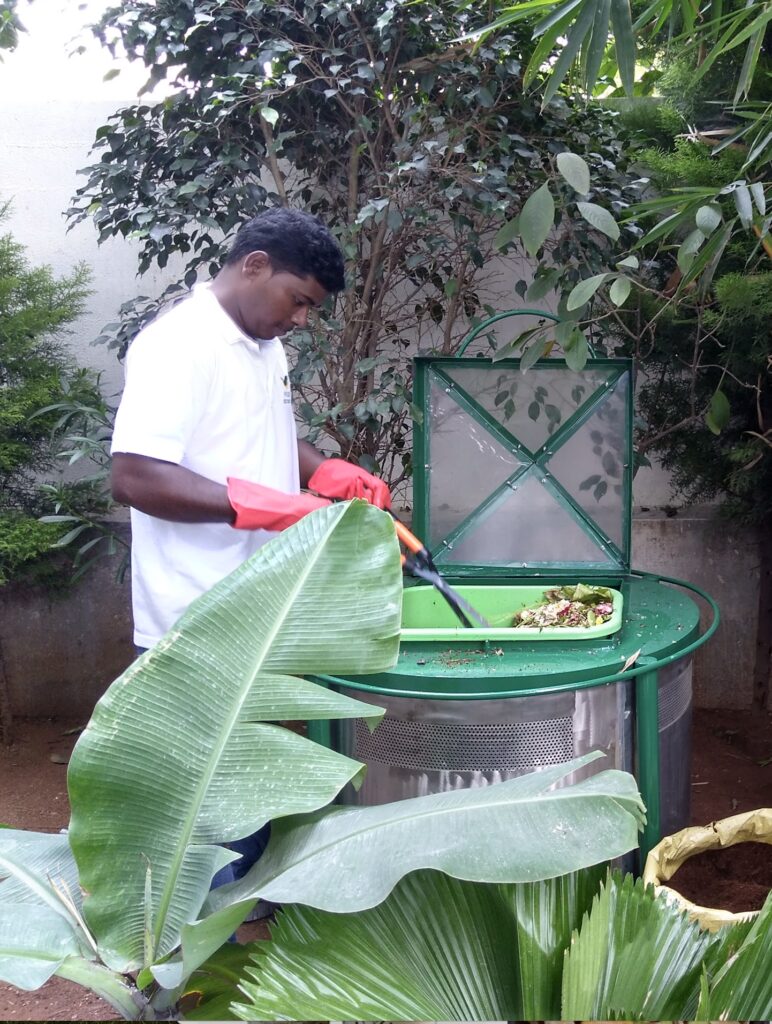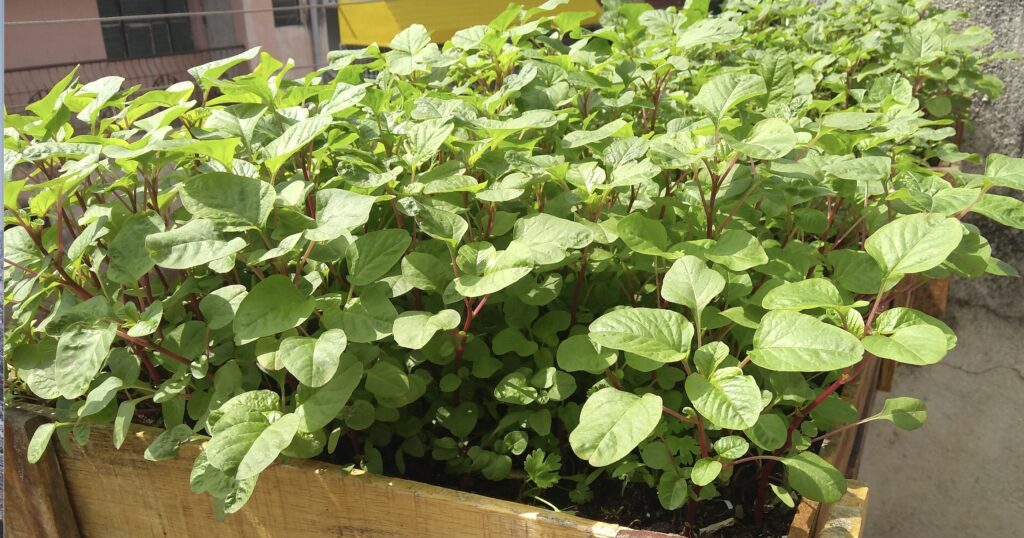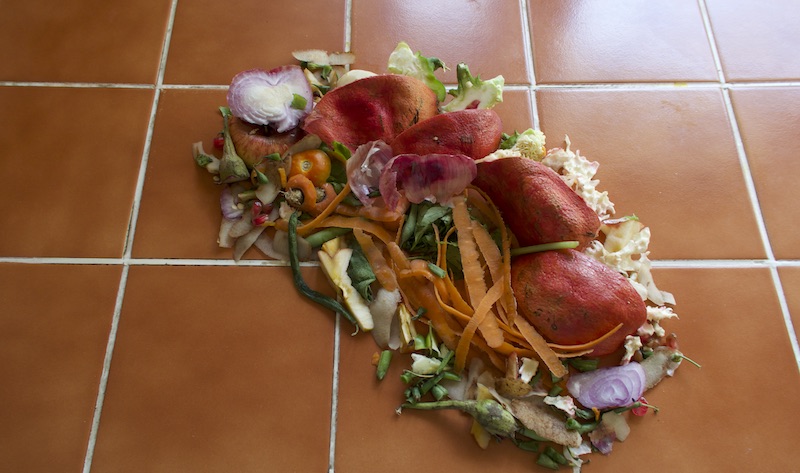Sustainable living is about a lifestyle that not only conserves, but can be sustained in challenging circumstances. It requires foresight to appreciate a problem and a collective will to act in time. It was, therefore, not a surprise but another affirmation of our belief when we realized that the on-site community kitchen waste composting solution that had been set up in our locality, four years ago, kept functioning through the Covid-19 lockdown. The result? In the midst of the scare and lifestyle challenges brought on by the novel corona virus, garbage disposal was a non-issue in this particular community.
Kapokseed chatted with Ravindra Karnad, Director (Engg) of Prudent Eco Systems Pvt Ltd., a company that specializes in Solid Waste Composting solutions for urban living. An IIT Kanpur graduate, Ravindra started his career at Tata Institute of Fundamental Research and went on to explore different companies and domains before setting up Prudent. Started in 2014, it took Prudent about a year to bring to market the Marigold, a solar composter. Available in different sizes to suit individual as well as community composting needs, the Marigold has been gradually getting deployed in several communities, office complexes and households. Here’s an excerpt from our conversation with Ravindra.
Tell us about your product and the composting process
Our product is an aerobic wet waste composting solution. Kitchen waste, segregated at household level and collected from doorstep, is first inspected for foreign objects. We have seen that in spite of household level segregation, bits of plastic packaging, bottle lids and even, sometimes, spoons and cans are almost always there in the collected waste. Hence, the waste needs to be re-segregated. Next, it is mixed with leaf powder or coco-peat and the mixed mass is put into the composting bin. Henceforth, it will be aerated, by stirring, every day. The key to efficient composting is to ensure the right temperature in the bin. On start day, the material is at outside temperature, 35C, for example. By day 2, the temperature rises to 45 – 50C. Over the next couple of days the temperature crosses 60C and , in some cases reaches beyond 70C. Around the twelfth day, the mass cools down and comes back to ambient temperature. This indicates that the compost is ready. At this point it is transferred to a different bin for curing. In our solution we have multiple bins. Once a bin gets filled, typically in 1-2 days, we move on to the second bin and so on until the compost in the first bin is ready. Thus, at one site, we have about 8-12 bins, depending on the capacity. For an individual household, we have two bins only; after one bin gets filled, the second bin can be used for fresh waste as the first bin contents get composted.

How do you monitor if the composting is happening right?
Two things. One, we check the temperature every day. If it crosses 70C, for example, it implies carbon is getting rapidly consumed and this can result in bad odor. In that case we need to lower the temperature. We do that by adding more carbon. Two, we check the amount of leachate in the bottom tray. Excess leachate implies the composting will not be aerobic. To control the moisture, we add dry leaf powder or cocopeat. The staff maintains a daily temperature log sheet. This enables us to trace back in case there is any issue.
Tell us about the special design features of your composter
The bin has a transparent lid that enables greenhouse effect, hence the name “Solar Composter”. It helps raise the temperature, if the bin is placed outdoors. The base is perforated to allow aeration and the leachate liquid to drain off. The sides are insulated to help heat retention. This helps maintain uniform temperature throughout the pile.
What is your service model?
Initially, we started as an engineering enterprise but later started offering services, as well. In this model, we send our trained staff to run day-to-day operations of the composter. Not everybody requires services. Companies, for example, manage composting with their own labour. We also have a third business model where the customer does not buy the composter upfront but pays a small subscription fee every month. In such cases, we rent our composters and manage the composting as well.

What are the challenges in managing the labour force?
We realized that managing a composting setup involves a special kind of work. Often, it comes with a stigma as well. So, we needed the right profile of people. As of now we have a staff of 7-10 labourers plus one supervisor. Compensation includes fixed salary, ESI & PF benefits plus an annual ticket to visit hometown. Work hours are 6 to 8 hours, 6 days/ week. Recently, we broke one more barrier as we employed two women labourers. We crafted appropriate roles that could utilize the women effectively and add value.
How did you manage to continue on-site composting even during the Covid-19 lockdown?
Actually, it was quite smooth .We procured the required government passes and our workers could travel with no problem. Other than the first few days, we managed to serve everybody. During lockdown we had to keep the factory closed. The service model enabled us to keep some part of the business running. With public transport coming to a standstill, we provided cycles/scooters/e-cycle to the staff. In one case, the residents association provided on-site accommodation.
In how many locations have you deployed your solution? What are the future plans?
Bangalore and Mysore are the two major cities where we have several deployments. We also have some isolated deployments in Tirupur and Gurgaon. Regarding future plans, we are working with a polyhouse

provider to create a “plug & play” vegetable garden suitable for apartment balcony, terrace or backyard of independent dwellings. We believe that this product, in conjunction with our composter which will provide the compost required for the garden, is an ideal self-sustainable solution for an urban home.
Do you think this lockdown has lightened the municipality’s load in terms of the quantum of waste generated and hence disposed?
Most definitely yes. In Bangalore, the “so-called” bulk generators, such as malls, restaurant, business campuses, are required to manage their own waste, only sending out rejects. However, several bulk generators continue sending their waste out, resulting in the municipality having to handle huge amounts of waste. With these institutions being closed, it provides a huge relief to the municipality, since the quantum of waste generated by such institutions is huge.
What do you think are the challenges in popularizing composting? Is there any government policy that you will advocate?
Studies across the world have shown that people take to composting either because they are passionate about the environment or because it has been enforced by the government. If one wants to compost at-home or a community wants to do on-site composting, there are plenty of solution providers with several players (almost 40 in Bangalore) in the field offering different solutions. Hence availability or, even, affordability is not a problem. If we want larger sections of the population to adopt sustainable waste management practices, we need stricter laws and better enforcement.

Indeed, we hope citizens and the government keep working together and more individuals, communities and cities take to composting.
For more information regarding the Marigold composter, feel free to reach Prudent Ecosystems at [email protected].

